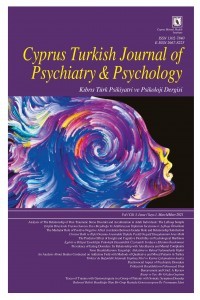Relationship between Depressive Symptoms and Life Satisfaction Among University Students
Depression, Life Satisfaction, University Students
___
- Alves G., Baptisa, M., & Santos, A. (2014). Relation between depression, family support and stress at work in undergraduates. International Journal of Psychology and Behavioral Sciences, 4(1), 9-15.
- Ceyhan, A., Ceyhan, E., & Kurtyılmaz, Y. (2009). Investigation of university students depression. Eurasian Journal of Educational Research, 36,75-90.
- Diener, Ed, & Suh, E. (1997). Measurıng quality of life: Economic, social and subjective indicators. Social Indicators Research. 30(1),189-216.
- Diener, Ed. (1984). Subjective well-being. Psychological Bulletin, 95(3), 542-575.
- Dost, M. (2007). Üniversite öğrencilerinin yaşam doyumunun bazı değişkenlere göre incelenmesi. Pamukkale Üniversitesi Eğitim Fakültesi Dergisi, 2(22), 132-143.
- Erturan, İ., Aktepe, E., Kocaman, O., Sönmez, Y., Başak, P.Y., Ceyhan, A.M., & Akkaya, V.B. (2014). Akneli ergenlerin yaşam kalitesi, yalnızlık ve yaşam doyumu düzeylerinin değerlendirilmesi. Türkderm, 48(4), 172-6.
- Friday, O., Aguwa, E., Schiweobi, C. (2015). Life Satisfaction, Self Esteem and Depression in a Sample of Nigerian Adolescents. International Neuropsychiatric Disease Journal, 5(3).
- Fukunaga, R., Abe, Y., Nakagawa, Y., Koyama, A., Fujise, N., & Ikeda, M. (2012). Living alone is associated with depression among the elderly in a rural community in Japan. Psychogeriatrics.12(3), 179–185.
- Guista, D., Jewell, M.S., & Kambhampati, U.S. (2011). Gender and life satisfaction in the UK. Feminist Economics, 17(3),1-34.
- Gündoğar, D., Gül, S., Uskun, E., Demirci, S., & Keçeci, D. (2007). Üniversite öğrencilerinde yaşam doyumunu yordayan etkenlerin incelenmesi. Klinik Psikiyatri, 10, 14- 27.
- Karaca, S., & Aşkın, R. (1995). Depresyonla Başaçıkma Ölçeği: Geçerlilik ve Güvenirlik Çal ışması. Düşünen Adam, 8(3), 24-30.
- Lewis, C., Dorahy, M., & Schumaker, J. (1999). Depression and Life Satisfaction Among Northern Irish Adults. The Journal of Social Psychology, 139(4), 533-5.
- Marcotte, E., Virgina, D., & Redmon, P. (1999). Prevalence and patterns of major depressive disorder in the United States Labor Force. The Journal of Mental Health Policy and Economics J. Mental Health Policy Econ, 2, 123–131.
- Matheny, K., Curlette, W., Aysan, F., Herrington, A., Gfroeroer, C., Thompson, D., & Hamarat, E. (2002). Coping resources, perceived stres and life satisfaction among Turkish and American university students. Int J Stress Manag, 9(2), 81-97.
- Mellor, D., Stokes, M., Firth, L., Hayashi, Y., & Cummins, R. (2008). Need for belonging, relationship satisfaction, loneliness, and life satisfaction. Science Direct Journals, 45(3), 213–218.
- Murray, C.J., & Lopez, A.D. (1996). Evidence based health policy lessons from the Global Burden of Disease. Study Science, 274(528), 740-743.
- Özkan, Ö. (2013). İnternet kullanımıyla ilgili değişkenlerin cinsiyet, kişilik özellikleri, yaşam doyumu ve bağlanma stilleri açısından incelenmesi. (Yüksek Lisans Tezi). T.C. Ankara Üniversitesi Sosyal Bilimler Enstitüsü Psikoloji Anabilim Dalı, Ankara.
- Öztürk, O., & Uluşahin, A. (2015). Ruh Sağlığı ve Bozuklukları. Ankara: Nobel Tıp Kitabevi.
- Richardson, A., Bergen, H., Martin, G., Roeger, L., & Allison, S. (2005). Perceived academic performance as an indicator of risk of attempted suicide in young adolescents. Archives of Suicide Research, 9(2), 163-176.
- Ross, C., Mirowsky, J., & Goldsteen, K. (1990). The impact of the family on health: the decade in review. Journal of Marriage and the Family, 52, 1059-1078.
- Russel, D., & Taylor, J. (2009). Living alone and depressive symptoms: The influence of gender, physical disability, and social support among Hispanic and NonHispanic older adults. Journal of Gerontology, 64(1), 95- 104.
- Shek, D., & Li, X. (2015). Perceived school performance, life satisfaction, and hopelessness: A 4-year longitudinal study of adolescents in Hong Kong. Soc Indic Res, 126(2), 921-34.
- Sundriyal, R., & Kumar, R. (2013). Depression and life satisfaction among married & unmarried women. IOSR Journal of Humanities And Social Science, 16(3), 33-36.
- Tiefenbach, T., & Kohlbacher, F. (2013). Happiness and life satisfaction in Japan by gender and age. German Institute for Japanese Studies.
- WHO. (2016). Depression. Accessed 13 August 2016. http://apps.who.int/mediacentre/factsheets/fs369/en/index.h tml
- Wilson, M., Andrew, C., & Oswald, J. (2005). How does marriage affect physical and psychological health? A survey of the longitudinal evidence. Institute for the Study of Labor.
- Yetim, Ü. (1991). Kişisel projelerin organizasyonu ve örüntüsü açısından yaşam doyumu. (Unpublished Phd Thesis). Ege Üniversitesi Sosyal Bilimler Enstitüsü, İzmir.
- Yetim, Ü. (2003). The impacts of individualism/collectivism, self-esteem, and feeling of mastery on life satisfaction among the Turkish university students and academicians. Social Indicators Research, 61(3), 297-317.
- Yıldırım, A., Hacıhasanoğlu, R., & Karakurt, P. (2011). The relationship between postpartum depression and social support and affecting factors. International Journal of Human Sciences, 8(1), 31-45.
- ISSN: 1302-7840
- Yayın Aralığı: Yılda 4 Sayı
- Başlangıç: 2000
- Yayıncı: Kıbrıs Ruh Sağlığı Enstitüsü
Relationship between Depressive Symptoms and Life Satisfaction Among University Students
Helin ÖĞÜTÇÜ ZEMAN, Hande ÇELİKAY SÖYLER, Ayşe ENDER ALTINTOPRAK
Müge ERSOY, Tuğçe BALKIR, Meryem KARAAZİZ, Fahriye BALKIR
Ortaöğretim Öğrencilerinde Fen Öğrenmeye Yönelik Kaygı ve Motivasyon İlişkisi
Ece E. MÜEZZİN, Beste Ç. ÖZATA
Bağlanma ve Maternal Bağlanma Konusunda Bir Derleme
